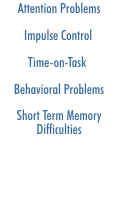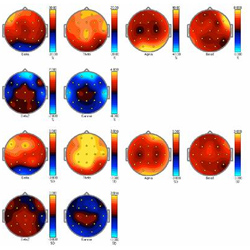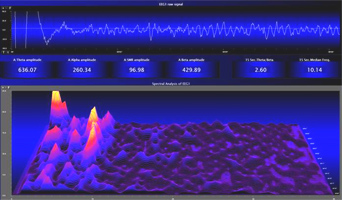

Neurofeedback / Biofeedback |
| Neurofeedback and Biofeedback allow a unique interface between the client and the clinician to promote self mastery skills. The goal of neurofeedback and biofeedback training is to allow the participant to learn how to improve attention, the ability to focus for prolonged periods of time and gain a sense of self control over his body and mind. Neurofeedback and Biofeedback are used to complement traditional therapy plans and help offer self awareness strategies to the individual. | ||
Brain Mapping: (QEEG) allows objective neurophysiological measures to be taken prior to interventions and allows objective documentation of changes as the program is administered.
 Parents often report that their child is unable to attend at all or long enough to complete homework, or the child can only hyper-focus on certain tasks but not others. Neurofeedback and Biofeedback training helps teach self-regulation and selective attention, thus increasing the individual's ability to focus on a task with more flexibility and less distractibility for application in various environments including school, work and home.  The user completes different types of training skills at our center. SIRRI combines many different technologies and strategies to effectively provide appropriate level training and success-based skills for the student. |
Can Neurofeedback and Biofeedback Help Improve School Performance?
Yes! Research shows that Neurofeedback and Biofeedback helps individuals in areas of creativity, attention, time on task, memory and reduced impulsivity.  Attention & Focus are essential to success in school. An inability to pay attention and stay focused can result in reduced grades and inappropriate behavior in the classroom.
Attention & Focus are essential to success in school. An inability to pay attention and stay focused can result in reduced grades and inappropriate behavior in the classroom.
Time On-Task is required to be able to complete school-work assignments. It should not take hours to do homework that normally should take 30 minutes. Not finishing assignments in class will lead to bad reports from the teacher, and poor grades. Visual Tracking is important to be able to follow what is written on the blackboard, and to follow what the teacher is doing as she gives a lesson in class. Discriminatory Processing is the ability to filter out external noise and distractions in order to stay focused on the primary stimuli. If your child has problems with discriminatory processing, even the most minor noise or movement can lead to substantial distraction. Short-Term Memory skills need to be developed to remember simple facts long enough so they may transfer into long-term memory. Problems with short-term memory will often lead to an inability to fulfill simple multi-step tasks. |
|